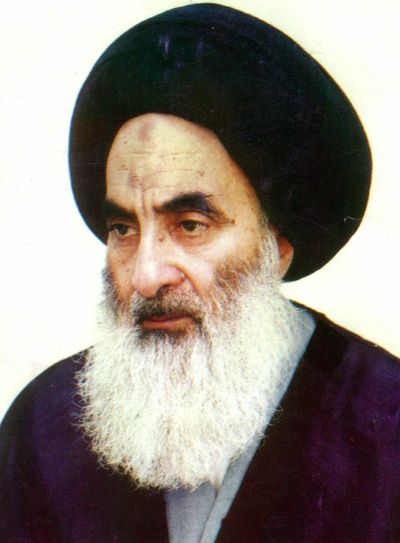Iraq’s Cabinet to vote on new pact with U.S.
Country’s top Shiite cleric calls deal ‘best available option’

BAGHDAD – Iraq’s Cabinet will vote today on a security pact with Washington that would keep U.S. forces in the country for three years, a major step in efforts to balance Iraqi demands for national sovereignty with the security concerns of the two allies.
In a bid to secure support for the agreement from the country’s top Shiite cleric, Prime Minister Nouri al-Maliki on Saturday dispatched two senior lawmakers to see Grand Ayatollah Ali al-Sistani in the holy city of Najaf, south of Baghdad, with a copy of the pact’s final draft.
A senior official at al-Sistani’s office said the cleric told the two legislators – Khalid al-Attiyah and Ali al-Adeeb – that the document represented “the best available option” for Iraq, signaling that he would not object to it if the Cabinet and later parliament approve it.
The official, who spoke on condition of anonymity because of the sensitivity of the subject, said al-Sistani indicated to al-Attiyah and al-Adeeb that he wanted the agreement to pass by a comfortable majority in the 275-seat parliament.
Al-Attiyah said al-Sistani had stressed the need for “national accord” over the agreement. Al-Adeeb said “His eminence, al-Sistani, is comforted by the thoroughness of Iraqi officials who shoulder the responsibility of safeguarding national interests.”
The U.N. mandate covering the presence of U.S. and other foreign forces in Iraq expires Dec. 31, and failure to pass the agreement would leave Iraq with little choice but to seek a renewal of the mandate.
A series of bombings Saturday pointed to the fragility of security gains in the past year. The violence also was likely to strengthen the argument of the pact’s proponents, including the interior and defense ministers, that there is still a need for U.S. forces.
In Tal Afar, a suicide car bombing struck a commercial district, killing nine Iraqis and wounding 40, according to the U.S. military.
In Baghdad, a bomb in a parked car exploded near the National Theater in the mainly Shiite district of Karradah, killing at least five and wounding 23, according to police and hospital officials.
The U.S. military said a suicide bomber in a vehicle in the northern city of Mosul injured 13 Iraqis on Saturday, and that a U.S. Marine died from wounds suffered in a roadside bombing west of Baghdad on Friday.
Also Saturday, two American soldiers died when a helicopter made a “hard landing” after hitting wires in Mosul, the U.S. military said.
The attacks Saturday raise questions about the preparedness of Iraqi forces and back assertions by proponents of the security pact that they still need American help.
A close aide to al-Maliki and two Cabinet ministers said Iraqi and U.S. negotiators have agreed on a final draft of the security pact and that it would be put to a vote in an emergency Cabinet meeting today.
The aide said the pact stood “a good chance” of being passed by a two-thirds majority in the 37-member Cabinet and that the final draft was reached after “intense” contacts between the American and Iraqi sides.
Al-Attiyah, one of the Shiite lawmakers who met al-Sistani, told reporters in Najaf that the Americans have agreed to two changes proposed by al-Maliki. One of the two, he said, removed a phrase that could delay the withdrawal of U.S. forces from Iraqi cities and back to bases in outlying areas by the end of June.
He did not mention the second change. Iraq has demanded guarantees for its right to try U.S. soldiers and defense contractors for serious crimes committed off-duty and off-base and to ensure that the United States does not use Iraqi territory to attack a neighboring country, such as Iran or Syria.
It also wanted stronger language to clarify that U.S. troops cannot stay in Iraq after Dec. 31, 2011.
If the Cabinet passes the draft agreement today, the 275-seat parliament could follow suit because the political blocs in al-Maliki’s government dominate the legislature.
The final step would be ratification of the deal by President Jalal Talabani and his two vice presidents.